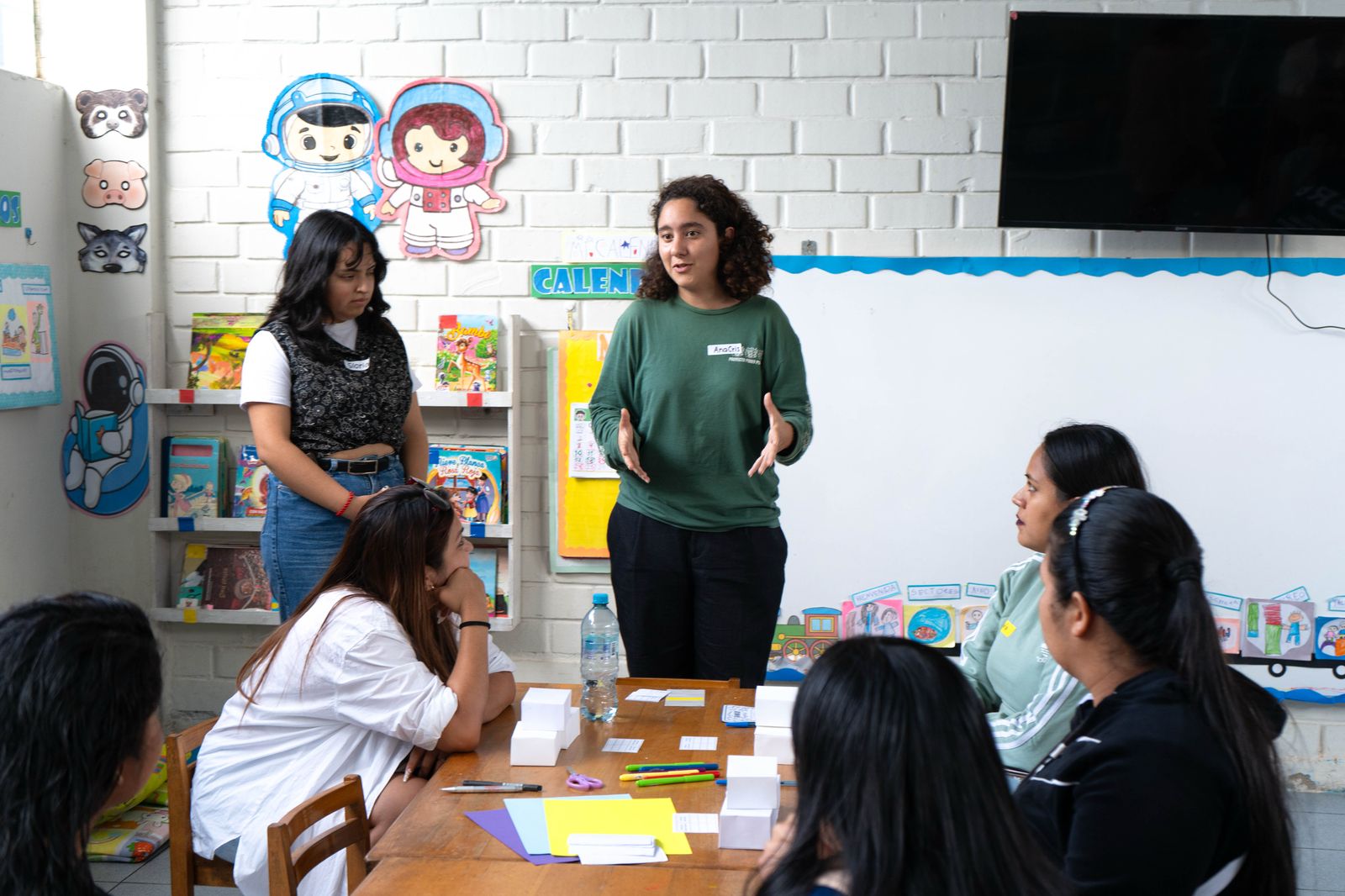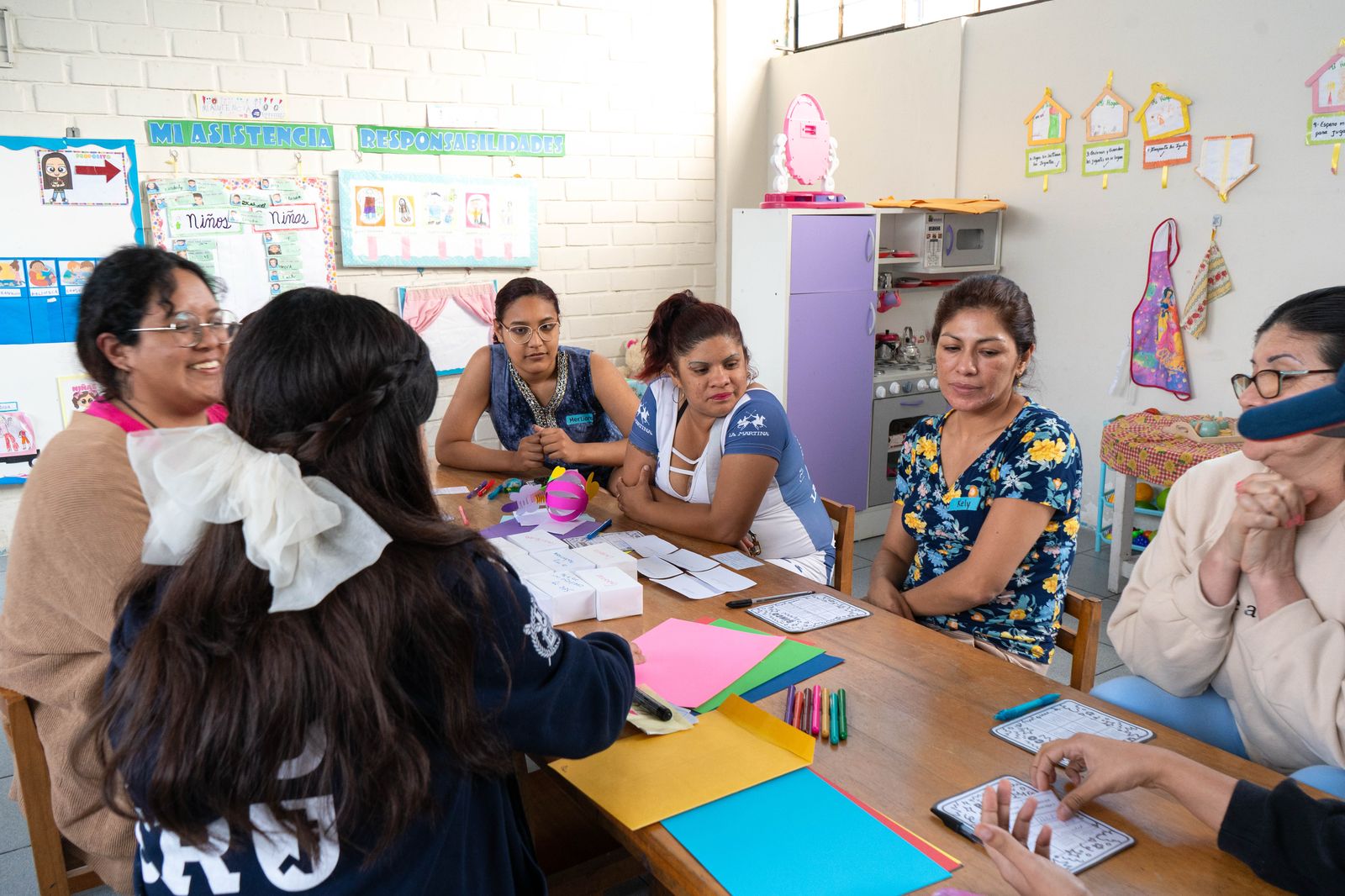By Ana Cristina Yáñez, Bibiana Salazar, Gloria Ayala, Micaela La Rosa, and Mauricio Capacyachi, Communicators for Development and creators of the project “Fatherhood with Tenderness.”

Motivated by personal experiences and the irony of absent fathers within our group, we embarked on a journey to construct and deconstruct fatherhood figures in order to foster stronger families and begin dismantling traditional gender roles.
In Peru, fatherhood has traditionally been associated with the role of provider, neglecting emotional upbringing. This absence impacts the emotional and social development of children and adolescents, leading to consequences that extend into adulthood. Active fatherhood is still seen as an exception rather than a shared responsibility. Furthermore, the lack of spaces for men to reflect on their parental role limits the possibility of transforming these patterns.
The “Fatherhood with Tenderness” project emerges as a communication initiative to challenge these structures and promote new forms of fatherhood based on co-responsibility and affection. As students of Communication for Development, an unconventional but essential field for achieving social transformation, we entered our final university cycle reflecting on our capstone project. After extensively analyzing different issues, we arrived at one undeniable truth: “everyone has a father.” Yet, relationships with this figure often present complex challenges that are difficult to convey.
Following the methodology learned throughout our studies, we immersed ourselves in diagnosing, designing, managing, and evaluating a real project—breaking away from previous proposals that often remained theoretical. Our main counterpart was an early childhood education institution, where we found the perfect setting to explore the intersection between fatherhood and masculinity. By working within an educational community, we aimed to promote greater parental responsibility within family structures, ultimately benefiting the students.
Paternal responsibility is closely linked to the construction of hegemonic masculinity, which continues to perpetuate traditional gender roles. In environments where men lack spaces for socialization, maintain their role as providers, and are absent from their children’s daily lives, fatherhood tends to be absent or minimally engaged in family growth. To help break these traditional fatherhood models and offer new structures that embrace the diversity of masculinities while fostering responsibility and solidarity within family bonds, this project was designed with the objective of “Promoting communication spaces for the socialization of new fatherhood models, allowing the discussion of traditional mandates and the reflection on conventional gender roles.”

The project developed along two main paths: one digital and one within the school itself. The first involved using Instagram as a digital platform to make the project visible, question societal representations of fatherhood, and communicate our efforts to reconstruct them. Within the school, we established a close bond with the educational community from the beginning, ensuring their active participation in the activities we planned. These activities aimed to introduce new perspectives on fatherhood, fostering parents who are committed to their family’s well-being.
Additionally, insights gathered within the educational institution were fundamental to shaping the project. They allowed us to understand the main barriers and motivations fathers face in their parenting journey. Three key aspects stood out: first, every father carries a symbolic “backpack” filled with childhood experiences and lessons that influence their parenting style; second, while mothers typically have spaces to share their experiences, fathers lack these opportunities for dialogue and reflection on their fatherhood; and third, despite many fathers wanting to break away from traditional patterns, they lack clear role models for alternative approaches to parenting.
Based on these findings, we structured the project around three levels: At the individual level, the “Backpack” strategy invites fathers to reflect on the sociocultural influences that have shaped their role, reminding them that before becoming caregivers, they were also cared for. Through activities that explore paternal responsibilities and expectations, fathers use symbolic objects to map their emotions and recognize the sociocultural burdens that have influenced their parenting. This exercise not only allows them to look back on the past but also to question and redefine their role in the present. At the collective level, the “Narratives that Connect” strategy creates dialogue spaces where fathers can share their experiences and strengthen their paternal identity. Here, the construction of support networks and the exchange of experiences become key tools for making new forms of fatherhood visible and promoting co-responsible parenting practices in everyday life. Finally, at the systemic level, the “Breaking the Pattern” strategy promotes the visibility of fatherhood based on tenderness, care, and shared responsibility. Through short videos on social media, traditional roles are challenged with a narrative that highlights the importance of paternal commitment in parenting, turning each father into a role model for change within their community.

After five months of design and implementation, the project successfully raised awareness about inherited parenting patterns and their impact on children. The initiative reached 3,245 users on social media, who actively engaged with the content created. Within the school, discussions about modern fatherhood were fostered, reaching 40 participants, including fathers, mothers, and teachers. Among the reflections gathered, some parents shared statements such as, “Fatherhood is a radical but beautiful change,” “Being a father is a role with no beginning or end,” and “No one teaches us how to be parents.” Moreover, we realized that it was crucial to involve all possible actors in order to transform them into agents of change.
To ensure a sustainable impact, we designed a 2025 plan for the teachers, detailing the methodology and sharing the context, diagnosis, and findings. We invited them to create their own activities, ensuring that the project’s sustainability lies in its ability to be replicated and embraced by the educational community. This approach allows more fathers and mothers to find spaces for dialogue and reflection on their parental roles. Additionally, incorporating social media as part of the project ensures the longevity and continuity of these discussions beyond the school’s physical space. Lastly, we are still in the process of identifying new spaces and opportunities where rethinking fatherhood remains a relevant and necessary action.
Although significant changes were observed in participants’ perceptions and attitudes, there is still a long way to go to consolidate a more equitable vision of fatherhood rooted in tenderness. Transforming these patterns requires sustained efforts across various domains, including education, communication, and public policy. Only through a collective commitment as a society can we redefine fatherhood—not as an extraordinary gesture, but as a shared responsibility grounded in affection, care, presence, and respect for diverse fatherhood experiences.
Each of us has or knows a father figure; change begins with our intention to shape its representation in alignment with values that may have been forgotten but remain essential for nurturing future generations.
Parenting is an act of shared tenderness. Learn more about our project at @paternidadcon.ternura on Instagram. Feel free to reach out to us to continue building alliances in support of fatherhood.